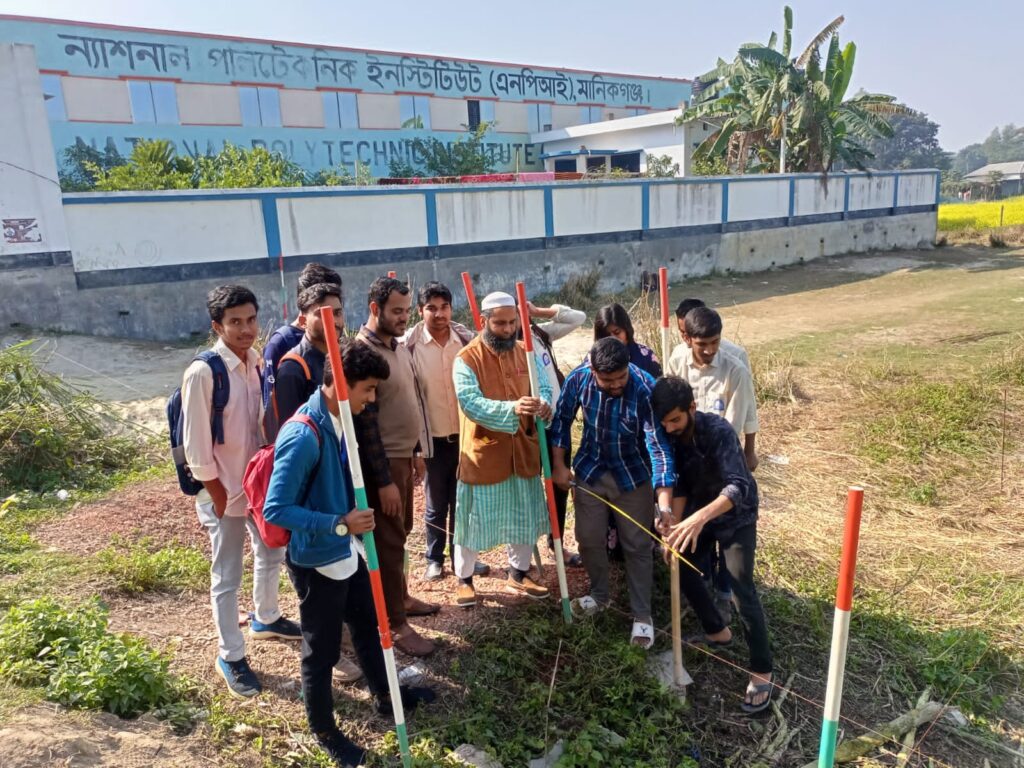Civil Engineering
Introduction.
Civil Engineering is one of the oldest and most significant branches of engineering. It deals with the design, construction, and maintenance of the physical and naturally built environment, including infrastructure such as roads, bridges, canals, dams, and buildings. This article delves into the importance and scope of Civil Engineering, highlighting the opportunities it offers, particularly for students at the National Polytechnic Institute Manikganj.
The Essence of Civil Engineering
Civil Engineering encompasses various sub-disciplines, each crucial in shaping the world we live in. At the National Polytechnic Institute Manikganj, students gain comprehensive knowledge and skills in the following areas:

1. Structural Engineering : This branch focuses on the design and analysis of structures that support or resist loads. Students at the National Polytechnic Institute Manikganj learn to ensure that buildings and bridges are safe and durable.
2. Geotechnical Engineering : This field involves the study of soil and rock behavior. Understanding the ground conditions is vital for the safe design of foundations, retaining walls, and other structures. The National Polytechnic Institute Manikganj provides in-depth training in geotechnical engineering.
3. Transportation Engineering : This area focuses on the design, construction, and maintenance of transportation systems, including roads, highways, and railways. Students at the National Polytechnic Institute Manikganj are prepared to tackle the challenges of modern transportation infrastructure.
4. Environmental Engineering : This branch deals with protecting and improving the natural environment. It includes water and air pollution control, waste management, and sustainable development. The National Polytechnic Institute Manikganj emphasizes environmental engineering to promote eco-friendly practices.
5. Water Resources Engineering : This field involves the management of water resources, including the design of dams, canals, and water distribution systems. Students at the National Polytechnic Institute Manikganj learn to ensure the sustainable use and management of water resources.
Civil Course Outline
SEMESTER-1
- Engineering drawing (61011)
English (65712)
Bangla (65711)
Physics‐1 (65912)
Mathematics‐1 (65911)
Workshop practice (67012)
Electrical engineering fundamental (66712)
- Engineering drawing (61011)
SEMESTER-2
- Civil engineering materials (66421)
Mathematics‐2 (65921)
Communicative English (65722)
Computer application (66611)
Physics‐2 (65922)
Physical education and life skill development (65812)
Electronic engineering fundamentals (66822)
- Civil engineering materials (66421)
SEMESTER-3
- Civil engineering drawing‐1 (66431)
Construction process‐1 (66433)
Surveying‐1 (66432)
Mathematics‐3 (65931)
Civil workshop practice (66434)
Social science (65811)
Chemistry (65913)
- Civil engineering drawing‐1 (66431)
SEMESTER-4
Structural mechanics (66441)
Surveying‐2 (66444)
Estimating & costing‐1 (66442)
Environmental studies (69054)
Geotechnical engineering (66445)
Business organization & communication (65841)
Civil engineering drawing‐2 (CAD) (66443)
SEMESTER-5
- Construction process‐2 (66451)
Theory of structure (66454)
Surveying‐3 (66452)
Hydraulics (66456)
Water supply engineering (66453)
Estimating & costing‐2 (66455)
Accounting theory & practice (65851)
- Construction process‐2 (66451)
SEMESTER-6
- Advance surveying (66461)
Design of structure‐1 (66463)
Transportation engineering‐1 (66462)
Foundation engineering (66465)
Civil engineering drawing‐3 (CAD) (66464)
Industrial Management (65852)
Civil engineering software (66466)
SEMESTER-7
- Construction management & documentation (68873)
Transportation engineering‐2 (66473)
Sanitary engineering (66472)
Water resources engineering (66475)
Design of structure-2 (66474)
Innovation & Entrepreneurship (65853)
Civil engineering project (66476)
Diploma In Civil Engineering Fees
| Admission Fee | Tution Fee (Per Month) | Semester Fee (Per Semester) | Total Fee |
|---|---|---|---|
| BDT. 5,000 | BDT. 2,000 | BDT. 11,000 | 1,20,000 |
